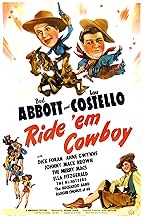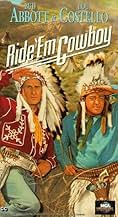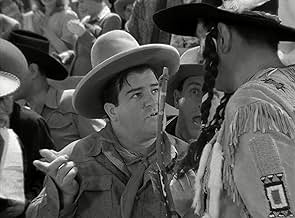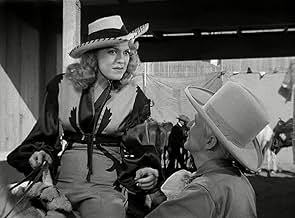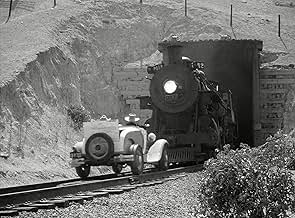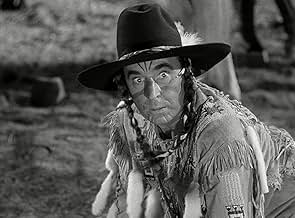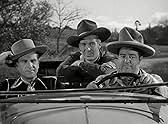Adicionar um enredo no seu idiomaTwo peanut vendors at a traveling rodeo show get in trouble with their boss and hide out on a railroad train heading west. They get jobs as cowboys on a dude ranch, despite the fact that bot... Ler tudoTwo peanut vendors at a traveling rodeo show get in trouble with their boss and hide out on a railroad train heading west. They get jobs as cowboys on a dude ranch, despite the fact that both know nothing about cowboys, horses, or much of anything.Two peanut vendors at a traveling rodeo show get in trouble with their boss and hide out on a railroad train heading west. They get jobs as cowboys on a dude ranch, despite the fact that both know nothing about cowboys, horses, or much of anything.
- Direção
- Roteiristas
- Artistas
- Prêmios
- 1 indicação no total
- Tom
- (as The Merry Macs)
- Harry
- (as The Merry Macs)
- Dick
- (as The Merry Macs)
- Dotty Davis
- (as The Merry Macs)
- Ranch Cowhand Driving Bus
- (não creditado)
- Napping Cowpoke with Rake
- (não creditado)
- Rodeo Spectator
- (não creditado)
- Rodeo Spectator
- (não creditado)
- Rodeo Manager
- (não creditado)
Avaliações em destaque
Have you ever noticed that in their earliest films while they are top billed, Bud and Lou are extraneous to the plot. There's usually some romantic story plot and always some musical entertainment. Ride 'Em Cowboy fits this formula perfectly. Dick Foran who appeared in three Abbott and Costello films in this period is a western story writer who's publicity agent has made him a western superhero. Foran sings real nice, but he can barely ride a horse. Anne Gwynne, daughter of a dude ranch owner, learns the truth and spurns him. But the smitten Foran is determined to make himself all the cowboy she expects of him.
Dick Foran who had done some singing cowboy films at Warner Brothers in the Thirties was now at Universal and he had a pleasant singing voice and an easy manner that never intruded on the comedy of Bud and Lou. A big hit song for the World War II years, I'll Remember April, was introduced by him in this film.
And if Foran introducing a hit song wasn't enough, Universal got the Merry Macs to perform a few numbers and Ella Fitzgerald reprised her A Tisket A Tasket hit from the mid thirties. Something for everyone.
But after all this is Bud and Lou's film and they have some good moments themselves. Funniest I think is Costello trying to break a horse and he literally ropes Abbott along for the ride.
Douglass Dumbrille plays an Indian chief. For me, just the sight of the polished villainous Mr. Cedar of Mr. Deeds Goes to Town in an Indian suit is funny enough. But Costello shoots an arrow through the painted heart of his daughter's tepee which in that tribe is a marriage proposal. Costello is going to be wed to an Indian princess who looks like Rosie O'Donnell. He balks at the prospect and a running gag throughout the film is Dumbrille and the tribe chasing Costello to get him to the altar in a bow and arrow wedding. This same gag with the same principal players is used in their later film Lost in a Harem for MGM.
This is one of my favorite Abbott and Costello films and when you get to see it, it will be a favorite of your's as well.
There are still plenty of laughs, however; enough to rate this a slight improvement over their previous release, "Keep 'Em Flying." A western setting for Abbott and Costello provides enough comedy hijinks to offset the romance. Dick Foran is back, crooning his way into a girl's heart (in this case, it's Anne Gwynne), and really good music is provided by the aforementioned Miss Fitzgerald (though "Cow-Cow Boogie" mysteriously and unacceptably was cut from the final release) and the Merry Macs.
As top box office attractions, it can be understood why Universal stuck by the comedy-romance-music formula. However, it's wearing thin by even 1942 standards. "Ride 'Em Cowboy" is good, but one waits for the film where Abbott and Costello take center stage throughout the film (fortunately it happens before year's end with the release of "Who Done It"). 7 out of 10.
I first saw some of this movie in a silent version. It was released by Castle Films as a home movie for people who had 8mm projectors. It was about five minutes in length and the Castle title was "No Indians Please." It had the car chase scene where Abbott and Costello were being pursued by Indians on horseback. The Model A Ford just looks funny even without sound. It has a good special effect where the car is driven underwater.
The spectacular thing about this movie is the music. It was made about a dozen years before Rock and Roll music would be on the charts. This movie has a couple of numbers where Black and White musical artists are mixed musically in a way that basically is Rock and Roll. The combination of barndance cowboy music mixed with an uptempo African American group that is not unlike The Coasters of the fifties is prophetic. I don't think anyone knew what they almost had.
The story is OK. Bud and Lou are their usual selves managing to find trouble in the calmest of settings. A dude ranch, a drive in the desert, a bus trip and a stop to buy some Indian souvenirs causes much chaos.
If you like the bus in this movie, be sure to watch "It Happened One Night." Other bus movies would include "North By Northwest (One scene)," "The Big Bus," "D.O.A. (One scene)," "Speed" and "High Anxiety (One scene)."
Tom Willett
The boys do all sorts of routines throughout this very very funny outing which won't disappoint any of their fans. Crazy house routine, swimming pool scene, poker scene and the great driving finale are all highlights in one of their best. One or two of the songs slow the pace though (Foran's only).
In a story presented on two levels, the first goes to title character "Broncho Bob" Mitchell (Dick Foran), author of best selling western novels, making his introduction as the feature attraction of Greater New York Bennett Rodeo. In spite of his fame and fortune, Martin Manny (Charles Lane), his severest critic, who doubts him to be "a great western hero," intends on exposing him in his next column. Manny's suspicions are proved correct when a bull breaks away, causing Bob to fall from his horse and cover his face in fear while cowgirl Ann Shaw (Anne Gwynne) steps in to bulldog the bull by the horns. Her heroic deed causes her leg injury that keeps her from riding in the finals to win that $1,000 grand prize. The second level moves to pals, Duke (Bud Abbott) and Willoughby (Lou Costello), working as hot dog/ peanut vendors whose antics get them in trouble with the boss (Wade Boteler). After their latest antic, Duke and Willoughby take refuge in a cattle car taking them to the same train as Ann and Broncho Bob while bound for Arizona. While at the Lazy S Ranch in Gower Gulch owned by Ann's father (Samuel S. Hinds), Duke and Willoughby obtain work as hired hands for foreman, Bruce "Alabam" Corman (Johnny Mack Brown) while Ann helps Bob's cowboy hero reputation by training him to ride a horse for the upcoming Frontier Day Celebration before some unexpected situations take place.
During the course of its 86 minutes, there's time out for music. Songs by Don Rays and Gene DePaul include: "Give Me My Saddle" (sung by Dick Foran); "Wake Up Jacob" (sung by The Merry Macs); "A Tisket, a Tasket" (sung by Ella Fitzgerald/ music and lyrics by Fitzgerald and Al Feldman); "Beside the Rio Tonto Shore" (sung by The Merry Macs); "I'll Remember April" (sung by Dick Foran); "Rockin' and Reelin'" (The Merry Macs) and "Ride 'Em Cowboy" (sung by chorus). While song interludes might become intrusive for those interested in catching those Abbott and Costello routines, some of them work out quite well, in fact, almost working their way as highlights. Aside from Ella Fitzgerald's aforementioned "A Tisket a Tasket," the impressive tune of "I'll Remember April," was one that usually got edited out of commercial television presentations to provide for some paid advertising during its 90 minute time slot. This haunting number introduced by Foran singing it to Gwynne during a mountain moonlight ride is quite impressive, even more so with cowboy/ cowgirl chorus crooning beautifully in the background. The Merry Macs perform their numbers in true 1940s jive style while one notable sequence, featuring three black tap dancers, is presented too briefly, leaving indication of a show stopping number ending up on the cutting room floor.
While Costello's ad-libs and outbursts might come across as forced sometimes, whatever weakness RIDE 'EM COWBOY may have are redeemed by some fine comedy routines, ranging from Abbott and Costello's abridged reworking their poker game routine introduced in BUCK PRIVATES (1941); Costello's attempt to go swimming while wearing a type of bathing suit unseen since the Mack Sennett silent comedy days; Bud and Lou's entanglement with Indians (lead by Douglass Dumbrille as Jake Rainwater); Costello avoiding marriage to Moonbeam (Jody Gilbert), an overweight Indian Girl; to that great climatic chase between Indians on horseback after Bud and Lou in their jalopy, to laugh-filled results. The amusing "The Crazy House" skit, enacted as part of a dream sequence, originally introduced by Abbott and Costello in their burlesque days, was actually used to better advantage in their 1950s television episode titled "Peace and Quiet" from THE ABBOTT AND COSTELLO SHOW. Interestingly, "Crazy House," immediately following the "I'll Remember April" number, turned out to be another cut segment from most television prints during the 1960s and 70s.
RIDE 'EM COWBOY, distributed to home video and later DVD, had its share of cable TV broadcasts over the years, namely the Comedy Channel (late 1980s); American Movie Classics (2001) and Turner Classic Movies where it premiered July 25, 2010. While not essentially a western, RIDE 'EM COWBOY will sure to please any Abbott and Costello devotees whether they'd be riding horses, milking cows, or time out for others in the spotlight with song and dance. (***)
Você sabia?
- CuriosidadesFilm debut of Ella Fitzgerald.
- Erros de gravaçãoWilloughby's hat is pinned to the wall by a knife. When the hat is removed there are two holes in the wall implying that this was the second take.
- Citações
Willoughby: It's all our fault. Duke and I went running to hide from the boss and I let the cow's husband out.
Duke: He means the bull.
Willoughby: Bull nothin' it's a fact.
- ConexõesEdited into Western Melodies (1949)
Principais escolhas
- How long is Ride 'Em Cowboy?Fornecido pela Alexa
Detalhes
- Tempo de duração1 hora 22 minutos
- Cor
- Proporção
- 1.37 : 1
Contribua para esta página


